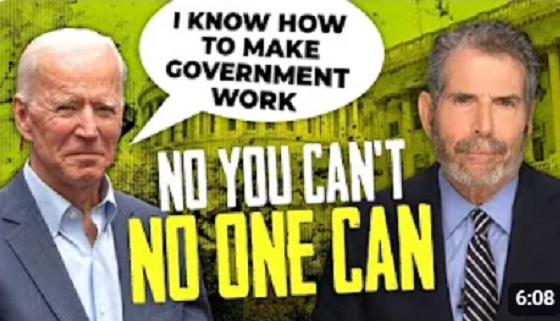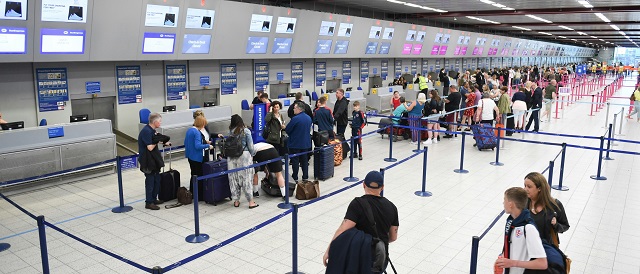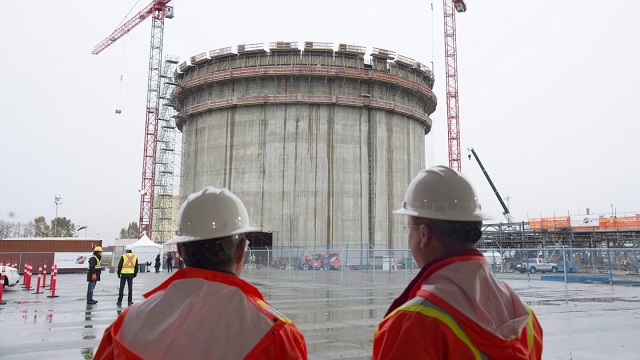Frontier Centre for Public Policy
Budget 2024 as the eve of 1984 in Canada

From the Frontier Centre for Public Policy
Those who claim there are unmarked burials have painted themselves into a corner. If there are unmarked burials, there have had to be murders because why else would anyone attempt to conceal the deaths?
The Federal Government released its Budget 2024 last week. In addition to hailing a 181% increase in spending on Indigenous priorities since 2016, “Budget 2024 also proposes to provide $5 million over three years, starting in 2025-26, to Crown-Indigenous Relations and Northern Affairs Canada to establish a program to combat Residential School denialism.” Earlier this spring, the government proclaimed:
The government anticipates the Special Interlocutor’s final report and recommendations in spring 2024. This report will support further action towards addressing the harmful legacy of residential schools through a framework relating to federal laws, regulations, policies, and practices surrounding unmarked graves and burials at former residential schools and associated sites. This will include addressing residential school denialism.
Like “Reconciliation,” the exact definition of what the Federal government means by “residential school denialism” is not clear. In this vague definition, there is, of course, a potential for legislating vindictiveness.
What further action is needed to address “the harmful legacy of residential schools” except to enforce a particular narrative about the schools as being only harmful? Is it denialism to point out that many students, such as Tomson Highway and Len Marchand, had positive experiences at the schools and that their successful careers were, in part, made possible by their time in residential school? If the study of history is subordinated to promoting a particular political narrative, is it still history or has it become venal propaganda?
Since the sensational May 27, 2021, claim that 215 children’s remains had been found in a Kamloops orchard, the Trudeau government has been chasing shibboleths. The Kamloops claim remains unsubstantiated to this day in two glaring ways: no names of children missing from the Kamloops IRS (Indian Residential Schools) have been presented and no human remains have been uncovered. For anyone daring to point out this absence of evidence, their reward is being the target of a witch hunt. As we recently witnessed in Quesnel, B.C., to be labeled as a residential school denialist is to be drummed out of civil society.
If we must accept a particular political narrative of the IRS as the history of the IRS, does our freedom of conscience and speech have any meaning?
To the discredit of the Truth and Reconciliation Commission, fictions of missing and murdered children circulating long before the Commission’s inception were subsumed by the TRC (Truth and Reconciliation Commission). Unmarked graves and burials were incorporated into the TRC’s work as probable evidence of foul play. In the end, the TRC found no evidence of any murders committed by any staff against any students throughout the entirety history of the residential schools. Unmarked graves are explained as formerly marked and lawful graves that had since become lost due to neglect and abandonment. Unmarked burials, if they existed, could be construed as evidence of criminal acts, but such burials associated with the schools have never been proven to exist.
Those who claim there are unmarked burials have painted themselves into a corner. If there are unmarked burials, there have had to be murders because why else would anyone attempt to conceal the deaths? If there are thousands of unmarked burials, there are thousands of children who went missing from residential schools. How could thousands of children go missing from schools without even one parent, one teacher, or one Chief coming forward to complain?
There are, of course, neither any missing children nor unmarked burials and the Special Interlocutor told the Senate Committee on Indigenous People: “The children aren’t missing; they’re buried in the cemeteries. They’re missing because the families were never told where they’re buried.”
Is it denialism to repeat or emphasize what the Special Interlocutor testified before a Senate Committee? Is combating residential school denialism really an exercise in policing wrongthink? Like the beleaguered Winston in Orwell’s 1984, it is impossible to keep up with the state’s continual revision of the past, even the recent past.
For instance, the TRC’s massive report contains a chapter on the “Warm Memories” of the IRS. Drawing attention to those positive recollections is now considered “minimizing the harms of residential schools.”
In 1984, the state sought to preserve itself through historical revision and the enforcement of those revisions. In the Trudeau government’s efforts to enforce a revision of the IRS historical record, the state is not being preserved. How could it be if the IRS is now considered to be a colossal genocide? The intent is to preserve the party in government and if it means sending Canada irretrievably down a memory hole as a genocidaire, so be it.
Michael Melanson is a writer and tradesperson in Winnipeg.
COVID-19
Peckford: Hallelujah! Supreme Court of Canada to hear Newfoundland and Labrador charter case

From the Frontier Centre for Public Policy
This will allow the SCC to address novel questions about the scope of mobility rights in Canada and the extent to which the government can limit Canadians’ rights to move freely around the country.
In what can only be considered a surprise move the SCC has agreed to hear an appeal of a decision of the Supreme Court of Newfoundland. Surprise because the Newfoundland and Labrador Court of Appeal refused to hear the appeal of this exact case.
For the Appeal Court it was the all too familiar excuse of the whole thing being too moot for the Court.
But now the SCC has agreed to hear the case. The parties, Kimberly Taylor and The Canadian Civil Liberties Association appealed to the court.
Here is a copy of the Civil Liberties Press Release dated April 26, 2024:
“Arbitrary travel restrictions infringe on the mobility rights of Canadians. CCLA’s challenge of Newfoundland government’s Bill 38 will continue before the Supreme Court of Canada (SCC), so that Canadians have clear, predictable, and stable answers to fundamental questions affecting their basic mobility rights.”
Back in May 2020, CCLA challenged the constitutionality of the Newfoundland government’s Bill 38 before the province’s Supreme Court. This Bill provided for a travel ban between provinces and other restrictive measures in the context of the COVID-19 pandemic. CCLA asked the Court to declare Bill 38 in violation of s.6 (mobility rights), as well as other Charter rights. CCLA also argued that the law could not be saved by s.1, which says that limits on rights must be reasonable and demonstrably justified. In September of 2020, the province’s Supreme Court found that the travel ban did violate the s.6 Charter right to mobility, but that such infringement could be justified under s.1. CCLA pursued this case before the Newfoundland and Labrador Court of Appeal. In August of 2023, the Court of Appeal refused to settle the merits of the appeal under the motive that it was moot, since the ban had been lifted. This was done despite all the parties urging the Court of Appeal to decide the appeal on the merits.
CCLA is pleased to learn that the SCC just granted its application seeking leave to appeal in this case. This will allow the SCC to address novel questions about the scope of mobility rights in Canada and the extent to which the government can limit Canadians’ rights to move freely around the country. CCLA is grateful for the excellent pro bono work of Paul Pape, Shantona Chaudhury and Mitchell McGowan from Pape Chaudry LLP in this file.”
Like the Association I am pleased that the highest court is going to hear the case. One can only assume that it will not just issue a silly moot decision given that they could have let the Court of Appeal decision of Newfoundland stand and not hear the case.
I hope the highest court considers the following given it is high time for the Constitution of This Country to be fairly applied and interpreted as written.
Courts have not the power to rewrite this sacred document. They are not omnipotent. That is for the people through its elected representatives as expressed in Section 38 of the Constitution Act 1982 in which the Charter is located—the Amending Formula.
The intent of Section 1 Of the Charter was that it could only be applied in a war, insurrection, the state being threatened circumstance. As one of the First Ministers involved and whose signature is on the original Patriation Agreement I submit this point of view was what was operative at the time of the construction of this section. All remaining First Ministers whose names are on that document are no longer with us. Sadly, no court has called me to provide my view.
This intent is clear In Section 4 (2) of the Charter:
“In time of real or apprehended war, invasion or insurrection, a House of Commons may be continued by Parliament and a legislative assembly may be continued by the legislature beyond five years if such continuation is not opposed by the votes of more than one-third of the members of the House of Commons or the legislative assembly, as the case may be.”
So, decisions that have been made concerning the Charter should only be made in this context. Numerous court deliberations here and in many western jurisdictions have considered intent in determining the legitimacy of legislation. This is not novel or new.
Hence, a glaring, fundamental mistake has occurred in interpreting our Charter. The blatant omission of considering the opening words of the Charter in any interpretation of legislation by the Courts is an abuse of the Charter, our Constitution. Where is the power provided the courts to engage is such omission? Those words are:
“Whereas Canada is founded upon principles that recognize the supremacy of God and the rule of law:”
The one reference of which I am aware in the Courts literature to any consideration of the opening words relating to God was by an Alberta Judge in a lower court foolishly indicated that the creators of the words did not identify God as being a Christian God. All the creators, the First Ministers, were Christians —that’s all. What an insult to our history and traditions and the authors?
And this has been allowed to stand?
And what about the rule of law? Little if anything has been done in considering and interpreting this point.
As for Section 1 itself of the Charter. If one can get past the previous points, which is impossible, but let’s speculate: the court in question in Newfoundland, like the courts across the land, have disfigured, misinterpreted the wording of this section —-
Rights and freedoms in Canada
The Canadian Charter of Rights and Freedoms guarantees the rights and freedoms set out in it subject only to such reasonable limits prescribed by law as can be demonstrably justified in a free and democratic society.
What is of crucial importance is ‘demonstrably justify ‘and a free and democratic society ‘—-is it not? Many try and evade confronting these concepts by emphasizing ‘reasonable ‘. But ‘reasonable ‘is qualified, if you will, with ‘as can be demonstrably justified ‘and ‘in a free and democratic society.’ This was deliberate by the creators and authors of this section.
So, as we all know such reasonable demonstration would be a cost benefit analysis, a tool used frequently by Government in considering new policies or programs —and this case especially when sacred rights enshrined in the constitution were to be taken way!!! Yet, there was none! And what about the Provincial Emergency Management organizations that were already established in all the provinces with immediate expertise. Were they consulted? Not one!
No such attempt was made, and the Governments did not conduct even a cursory cost benefit review and the courts eagerly accepted the one-sided Government narrative. Yet experts like Lt. Colonel David Redman, who had been involved in Emergency Management and had written extensively on it were never consulted!
And ‘free and democratic society? Was there any meaningful engagement of the Parliament of Canada or the Legislative Assemblies —-not really, ——only to delegate power to unelected bureaucrats and relieve the politicians of direct responsibility. Where were the Parliamentary Committees? The sober consideration of all points of view in an open public session? Of independent science? Does not free and democratic society entail such deliberations?
And to those courts / governments who talk about little time—in this Newfoundland case it was 6 months before The Supreme Court of the Province ruled and 15 months for the Court of Appeal to issue a non-decision! So much for serving the people!
As for the concept of ‘mootness ‘that has been most dramatically used by the Federal Court and the Federal Court of Appeal and The Court of Appeal in Newfoundland? This is a construct of the court not the Constitution.
It denies a citizen the right to know whether a government action to which a citizen was subjected violates the Charter. Should a court idea of mootness, refusing to rule on whether a government action of only months before overruling the people’s right to know if their rights and freedoms were violated? Is this not the role of the Court? To protect the rights and freedoms of the citizens from Government overreach? That was and is the whole point of the Charter.
Whether the Government action is presently operative or not should be irrelevant, especially when millions of citizens were involved and especially when it involved rights and freedoms protected under the Charter, our Constitution. There may be a role for mootness if a frivolous matter is established but by any measure what we are discussing is anything but a frivolous matter, even though The Newfoundland Court of Appeal in calling the whole thing ‘moot ‘had the gall to find the Government’s action of denying rights ‘fleeting.’ Courts have abdicated their solemn responsibilities to the people in the exaggerated use of such Court constructed procedures.
So the highest court can go back to ‘first principles’, and examine intent and the opening words of the Charter and place them in full context in any interpretation of the Charter. If this were done then Section 1 of the Charter would not even be in play. Constructing a hypothetical i.e. considering Section 1 of the Charter during the so called ‘covid emergency’, well, even if we do, the Government and Court reasoning would have failed as demonstrated above.
There is an opportunity through this case as well as the one in which I am involved for our highest court to get it right——to return to the full constitution and re-establish the ‘supremacy of God and the rule of law, ‘the legitimate role of Parliament, to the plain meaning of demonstrably justify, and the importance of intent in interpreting our Charter.
Is the Supreme Court of Canada up to the challenge?
Will our Constitution, our democracy be restored?
The Honourable A. Brian Peckford P.C. is the last living First Minister who helped craft the Canadian Charter of Rights
Watch – Leaders on the Frontier: Brian Peckford on Saving Canada’s Democracy | Frontier Centre For Public Policy (fcpp.org) January 20, 2022
Addictions
Why can’t we just say no?

From the Frontier Centre for Public Policy
Drug use and violence have become common place in hospitals. Drug-addicted patients openly smoke meth and fentanyl, and inject heroin. Dealers traffic illicit drugs. Nurses are harassed, forced to work amidst the toxic fumes from drugs and can’t confiscate weapons. In short, according to one nurse, “We’ve absolutely lost control.”
“Defining deviancy down” is a cultural philosophy that emerged in the United States during the 1990s.
It refers to society’s tendency to adjust its standards of deviancy “down,” so that behaviours which were once unacceptable become acceptable. Over time, this newly- acceptable behaviour can even become society’s norm.
Of course, the converse must also be true — society looks down on those who label social behaviours “wrong,” deeming them moralistic, judgemental or simply out of touch with the realities of modern life.
Thirty years later, this philosophy is entrenched in British Columbia politics and policies. The province has become a society that cannot say “no” to harmful or wrong behaviours related to drug use. It doesn’t matter if you view drug use as a medical issue, a law-and-order issue, or both – we have lost the ability to simply say “no” to harmful or wrong behaviour.
That much has become abundantly clear over the past two weeks as evidence mounts that BC’s experiment with decriminalization and safe supply of hard drugs is only making things worse.
A recently-leaked memo from BC’s Northern Health Authority shows the deleterious impact these measures have had on BC’s hospitals.
The memo instructs staff at the region’s hospitals to tolerate and not intervene with illegal drug use by patients. Apparently, staff should not be taking away any drugs or personal items like a knife or other weapons under four inches long. Staff cannot restrict visitors even if they are openly bringing illicit drugs into the hospital and conducting their drug transactions in the hallways.
The public was quite rightly outraged at the news and BC’s Health Minister Adrian Dix quickly attempted to contain the mess by saying that the memo was outdated and poorly worded.
But his facile excuses were quickly exposed by publication of the very clearly worded memo and by nurses from across the province who came forward to tell their stories of what is really happening in our hospitals.
The President of the BC Nurses Union, Adriane Gear, said the issue was “widespread” and “of significant magnitude.” She commented that the problems in hospitals spiked once the province decriminalized drugs. In a telling quote, she said, “Before there would be behaviours that just wouldn’t be tolerated, whereas now, because of decriminalization, it is being tolerated.”
Other nurses said the problem wasn’t limited to the Northern Health Authority. They came forward (both anonymously and openly) to say that drug use and violence have become common place in hospitals. Drug-addicted patients openly smoke meth and fentanyl, and inject heroin. Dealers traffic illicit drugs. Nurses are harassed, forced to work amidst the toxic fumes from drugs and can’t confiscate weapons. In short, according to one nurse, “We’ve absolutely lost control.”
People think that drug policies have no impact on those outside of drug circles – but what about those who have to share a room with a drug-smoking patient?
No wonder healthcare workers are demoralized and leaving in droves. Maybe it isn’t just related to the chaos of Covid.
The shibboleth of decriminalization faced further damage when Fiona Wilson, the deputy chief of Vancouver’s Police Department, testified before a federal Parliamentary committee to say that the policy has been a failure. There have been more negative impacts than positive, and no decreases in overdose deaths or the overdose rate. (If such data emerged from any other healthcare experiment, it would immediately be shut down).
Wison also confirmed that safe supply drugs are being re-directed to illegal markets and now account for 50% of safe supply drugs that are seized. Her words echoed those of BC’s nurses when she told the committee that the police, “have absolutely no authority to address the problem of drug use.”
Once Premier David Eby and Health Minister Adrian Dix stopped denying that drug use was occurring in hospitals, they continued their laissez-faire approach to illegal drugs with a plan to create “safe consumption sites” at hospitals. When that lacked public appeal, Mr. Dix said the province would establish a task force to study the issue.
What exactly needs to be studied?
The NDP government appears to be uninformed, at best, and dishonest, at worst. It has backed itself into a corner and is now taking frantic and even ludicrous steps to legitimize its experimental policy of decriminalization. The realities that show it is not working and is creating harm towards others and toward institutions that should be a haven for healing.
How quickly we have become a society that lacks the moral will – and the moral credibility – to just to say “no.”
Susan Martinuk is a Senior Fellow with the Frontier Centre for Public Policy and author of Patients at Risk: Exposing Canada’s Health-care Crisis.
-

 John Stossel2 days ago
John Stossel2 days agoWhy Biden’s Just Wrong: NO ONE “Knows How to Make Government Work.”
-

 Business2 days ago
Business2 days agoWEF panelist suggests COVID response accustomed people to the idea of CBDCs
-

 COVID-192 days ago
COVID-192 days agoPeckford: Hallelujah! Supreme Court of Canada to hear Newfoundland and Labrador charter case
-

 illegal immigration2 days ago
illegal immigration2 days agoFlight Docs Reveal Which Cities Are Receiving Migrants Under Biden’s Parole Program
-

 COVID-192 days ago
COVID-192 days agoStates move to oppose WHO’s ‘pandemic treaty,’ assert states’ rights
-

 Environment2 days ago
Environment2 days agoJournalism Misrepresent Climate Science
-

 Automotive1 day ago
Automotive1 day agoVehicle monitoring software could soon use ‘kill switch’ under the guise of ‘safety’
-

 Canadian Energy Centre2 days ago
Canadian Energy Centre2 days agoNorth America LNG project cost competitiveness





